There was a good showing of Board of Education candidates Tuesday night, with only two no shows: Nyesha McCauley (Republican), whose absence was noted as related to her having recently given birth, and Richard Barton (Republican). On the panel: Milly Arciniegas (Parents’ Choice), Albert L. Barrueco (Democrat), Robert Cotto, Jr. (Working Families), Michael J. Fryer (Republican), Lori Hudson (Democrat), Elizabeth Brad Noel (Working Families), Sharon Patterson-Stallings (Working Families), Ines Duke Pegeas (Petitioning Candidate), Cherylann Perry (Parents’ Choice), Luis Rodriguez-Davila (Democrat), and Mary R. Storey (Parents’ Choice).
As always, in Hartford politics, some people had to bring their posse to fill the audience and testify. The annoying theatrics were kept to a minimum, thanks to the moderation of John Motley, who also provided well-timed comic relief. Still, what gathered the most applause did not tend to be the most intelligent comments, but those who shouted the loudest. From a rhetorical standpoint, Hartford voters tend to respond directly to emotional tactics. One hopes that reason will rule when they enter the voting booths.
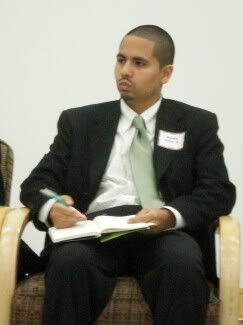 Robert Cotto, Jr. of the Working Families Party was the most prepared, as he provided facts and statistics nearly every time he responded to a question. The teacher and Harvard graduate argued that while magnet schools help students, charter schools do not. An example he gave was Achievement First, where a parent reported that her autistic child was not being sufficiently helped. When asked about the reduced transportation budget that has forced more children to walk to school, he suggested that other parts of the budget should have been cut first, citing page 234 of the budget, which shows that three people have a salary of
Robert Cotto, Jr. of the Working Families Party was the most prepared, as he provided facts and statistics nearly every time he responded to a question. The teacher and Harvard graduate argued that while magnet schools help students, charter schools do not. An example he gave was Achievement First, where a parent reported that her autistic child was not being sufficiently helped. When asked about the reduced transportation budget that has forced more children to walk to school, he suggested that other parts of the budget should have been cut first, citing page 234 of the budget, which shows that three people have a salary of $100,000 $300,000 each. To show the poor choice in budget cuts, he referenced the recent accident in which a school crossing guard was hit by a car, explaining that it is not safe for children to be walking such distances to school. To address the gang problem that has created controversy this past week, he said that the first thing we need to do is admit there is a problem. He then referred to the need for community centers. A highlight of the evening was when a Hartford High student asked candidates questions. Responding to her inquiry about the slashing of arts and other important programs, Cotto pointed out that Classical Magnet and Bulkeley High both have the same number of teachers for “specials,” but that Classical Magnet has about half the student population as Bulkeley. He also apologized directly to the student for her inability to benefit from any of these programs.
The remaining candidates were not as fast with the facts, but most seemed to be at least moderately qualified to sit on the Board of Education.
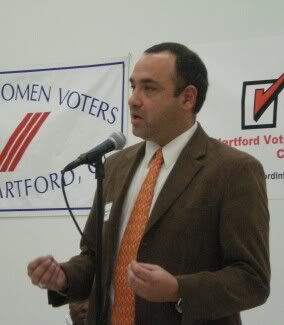 Michael J. Fryar, a high school dropout, seems promising. He explained how despite dropping out, he managed to rise through the higher education system, eventually earning a JD. The perspective of someone who felt pushed out of high school seems useful to have on the Board of Education. Understanding first hand the factors that contribute to dropping out can be helpful in prevention of it. Addressing the question of how it is possible for so many high school graduates to be functionally illiterate, he suggested that teachers must not be paying attention; afterall, he said, one need only read a paragraph writing sample to determine if someone is literate or not. As an educator, I can attest to the truth in that. When asked about the success of magnet and charter schools, he said that variation is good and that these schools help students who might not succeed in neighborhood schools, but that there are not enough different types of schools– there is not enough variation to reach special ed, non-traditional, and drop-out students. He seemed concerned with student retention, an issue that some candidates breezed over in favor of complaining about how parents are allegedly not listened to by the current Board of Ed. Finally, Fryar said that the BOE should be active in fighting the problem of gangs entering schools. He gave an example of a situation when he was teaching in Bridgeport. A student had come in one day “out of it,” clearly traumatized from an experience the night before when gang members busted into her home. While they ransacked the house she was terrified that she would be raped. He explained how students who suffer this kind of terrorism can not possibly focus on school.
Michael J. Fryar, a high school dropout, seems promising. He explained how despite dropping out, he managed to rise through the higher education system, eventually earning a JD. The perspective of someone who felt pushed out of high school seems useful to have on the Board of Education. Understanding first hand the factors that contribute to dropping out can be helpful in prevention of it. Addressing the question of how it is possible for so many high school graduates to be functionally illiterate, he suggested that teachers must not be paying attention; afterall, he said, one need only read a paragraph writing sample to determine if someone is literate or not. As an educator, I can attest to the truth in that. When asked about the success of magnet and charter schools, he said that variation is good and that these schools help students who might not succeed in neighborhood schools, but that there are not enough different types of schools– there is not enough variation to reach special ed, non-traditional, and drop-out students. He seemed concerned with student retention, an issue that some candidates breezed over in favor of complaining about how parents are allegedly not listened to by the current Board of Ed. Finally, Fryar said that the BOE should be active in fighting the problem of gangs entering schools. He gave an example of a situation when he was teaching in Bridgeport. A student had come in one day “out of it,” clearly traumatized from an experience the night before when gang members busted into her home. While they ransacked the house she was terrified that she would be raped. He explained how students who suffer this kind of terrorism can not possibly focus on school.
 Lori Hudson also seemed to show a good mix of passion and intellect. She said that there is currently a disconnect between the policy makers and who the policies affect. Hudson said of the relationship between the Board of Education and parents that if elected, she would do her part, knowing that “while not [every parent is] going to participate […] they all have a right to know” about what is going on. Sharing a viewpoint with Elizabeth Brad Noel, Hudson asserted that “we continue to build schools we cannot staff,” and explained that the priorities should be (1) safety (2) qualified teachers (3) programs provided. She said that health clinics are a necessity in the schools, as some children come from families who lack insurance. Furthermore, she noted that the issue of teenage pregnancy must be addressed somewhere. Hudson’s shining moment was when she explained how numbers can be manipulated. This was in response to a question from the audience asking “if we’re doing so well, why do 60% of our students fail?” She explained that the suburban children who are attending Hartford’s schools throw off the statistics. If elected to the Board of Education, she said she would demand accountability across the board– not just from teachers, administrators, and the BOE, but from the parents as well.
Lori Hudson also seemed to show a good mix of passion and intellect. She said that there is currently a disconnect between the policy makers and who the policies affect. Hudson said of the relationship between the Board of Education and parents that if elected, she would do her part, knowing that “while not [every parent is] going to participate […] they all have a right to know” about what is going on. Sharing a viewpoint with Elizabeth Brad Noel, Hudson asserted that “we continue to build schools we cannot staff,” and explained that the priorities should be (1) safety (2) qualified teachers (3) programs provided. She said that health clinics are a necessity in the schools, as some children come from families who lack insurance. Furthermore, she noted that the issue of teenage pregnancy must be addressed somewhere. Hudson’s shining moment was when she explained how numbers can be manipulated. This was in response to a question from the audience asking “if we’re doing so well, why do 60% of our students fail?” She explained that the suburban children who are attending Hartford’s schools throw off the statistics. If elected to the Board of Education, she said she would demand accountability across the board– not just from teachers, administrators, and the BOE, but from the parents as well.
She seemed to be the only candidate with the nerve to suggest parents be held accountable. This sentiment was certainly not coming from any of the Parents’ Choice candidates, who (two out of three) were among the weaker of the candidates.  Cherylann Perry, for one, could not string words together to form anything recognizable as a sentence all evening. At first, I wanted to assume this was just nervousness, but her complete inability to express a single idea well was maintained for hours. She certainly had passion, but passion alone does not make one qualified. Nor does being a parent. Certainly parents should strive to be involved in their children’s education, but the mere act of giving birth does not entitle one to have a place on the Board of Education. The most straightforward answer Perry provided was related to whether or not school buildings should be used by the community after hours. Her answer was “yes, but it depends on the circumstance,” which was not totally clarified. She did favor schools being used for tutoring services. Her response to the Hartford High student’s question about the disappearance of physical education was rambling at best, with the statement that “physical education is part of your brain.” Most of the questions the candidates were asked were fairly predictable, so being totally unprepared to speak coherently to anyone of them is a bit unforgivable, nervous or not. Notes were permitted and several candidates did in fact use them. If there is a problem of communication between parents and the current Board of Education, then candidates should ensure that they represent themselves as part of the solution to this problem. Mary R. Storey, another Parents’ Choice candidate, also relied on the “we’re parents, we’re angry, and we’re not gonna take it anymore” mentality, though her responses were a bit more fine-tuned than Perry’s. Someone must have told Storey that yelling was a way to win over a crowd because every answer she gave included a sharp rise in her volume and intonation. It was difficult to listen to. Her most reasonable response argued that while culinary and journalism concentrations in some schools are good, some children can not read. She also made a point by suggesting that the parents of suburban students who use city schools should have to pay for their kids to come here, as they “take away from our children” financially. This made a nice soundbite, but I would have liked this statement to have been supported by data indicating how exactly the funding breaks down. The rest of her answers were either generic or of the finger-pointing variety (“too many teachers have failed”). In her closing remarks she referred to an incident in which a police officer escorted a parent out of one of the schools. While this seemed intended to rile up the parents in the audience, one has to ask what details were left out of this story. Why was this parent insisting on being in the school? How was he or she behaving? Did he or she make an arrangement to drop in? From an educator’s perspective, having visitors dropping into the classroom can be an enormous distraction. If there are children with certain disabilities (such as autism) who rely heavily on having predictable schedules, such disruptions can be detrimental to their day. In my experience of working in public schools, there were times when parents could volunteer in the classroom, but parents would never just drop by. In as far as I can tell, the norm in local schools is to not allow random visitors. Perhaps there was more to Storey’s story. Milly
Cherylann Perry, for one, could not string words together to form anything recognizable as a sentence all evening. At first, I wanted to assume this was just nervousness, but her complete inability to express a single idea well was maintained for hours. She certainly had passion, but passion alone does not make one qualified. Nor does being a parent. Certainly parents should strive to be involved in their children’s education, but the mere act of giving birth does not entitle one to have a place on the Board of Education. The most straightforward answer Perry provided was related to whether or not school buildings should be used by the community after hours. Her answer was “yes, but it depends on the circumstance,” which was not totally clarified. She did favor schools being used for tutoring services. Her response to the Hartford High student’s question about the disappearance of physical education was rambling at best, with the statement that “physical education is part of your brain.” Most of the questions the candidates were asked were fairly predictable, so being totally unprepared to speak coherently to anyone of them is a bit unforgivable, nervous or not. Notes were permitted and several candidates did in fact use them. If there is a problem of communication between parents and the current Board of Education, then candidates should ensure that they represent themselves as part of the solution to this problem. Mary R. Storey, another Parents’ Choice candidate, also relied on the “we’re parents, we’re angry, and we’re not gonna take it anymore” mentality, though her responses were a bit more fine-tuned than Perry’s. Someone must have told Storey that yelling was a way to win over a crowd because every answer she gave included a sharp rise in her volume and intonation. It was difficult to listen to. Her most reasonable response argued that while culinary and journalism concentrations in some schools are good, some children can not read. She also made a point by suggesting that the parents of suburban students who use city schools should have to pay for their kids to come here, as they “take away from our children” financially. This made a nice soundbite, but I would have liked this statement to have been supported by data indicating how exactly the funding breaks down. The rest of her answers were either generic or of the finger-pointing variety (“too many teachers have failed”). In her closing remarks she referred to an incident in which a police officer escorted a parent out of one of the schools. While this seemed intended to rile up the parents in the audience, one has to ask what details were left out of this story. Why was this parent insisting on being in the school? How was he or she behaving? Did he or she make an arrangement to drop in? From an educator’s perspective, having visitors dropping into the classroom can be an enormous distraction. If there are children with certain disabilities (such as autism) who rely heavily on having predictable schedules, such disruptions can be detrimental to their day. In my experience of working in public schools, there were times when parents could volunteer in the classroom, but parents would never just drop by. In as far as I can tell, the norm in local schools is to not allow random visitors. Perhaps there was more to Storey’s story. Milly 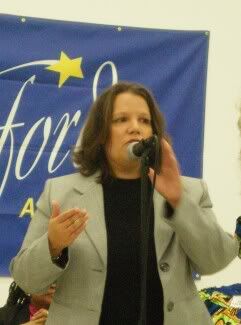 Arciniegas was the most reasonable of the three Parents’ Choice candidates. She argued for the top eight languages in the city to be represented (not sure how) and for there to be translation services for parents not speaking those top eight. She called for financial accountability, mentioning that it was not acceptable for schools to be unable to have toilet paper. Many of Arciniegas’ answers seemed to also fall into the generic and finger-pointing category, though she made an interesting argument (that I would like to see backed up with evidence) that teachers in Hartford get evaluated as “good” in such high numbers because if principals review them as “incompetent,” there are too many legal issues to deal with. Of the Parents’ Choice candidates, Arciniegas seemed to be the most clear and calm speaker, which is an appropriate way to maintain oneself during meetings.
Arciniegas was the most reasonable of the three Parents’ Choice candidates. She argued for the top eight languages in the city to be represented (not sure how) and for there to be translation services for parents not speaking those top eight. She called for financial accountability, mentioning that it was not acceptable for schools to be unable to have toilet paper. Many of Arciniegas’ answers seemed to also fall into the generic and finger-pointing category, though she made an interesting argument (that I would like to see backed up with evidence) that teachers in Hartford get evaluated as “good” in such high numbers because if principals review them as “incompetent,” there are too many legal issues to deal with. Of the Parents’ Choice candidates, Arciniegas seemed to be the most clear and calm speaker, which is an appropriate way to maintain oneself during meetings.
Sharon Patterson-Stallings and Elizabeth Brad Noel were the two most understated candidates present. It might be their experience speaking, but they seemed less concerned with being theatrical, instead simply addressing the questions. Brad Noel spoke of the need for arts, music, physical education, and guidance services in the schools, as well as the need to staff certified teachers. She declared that we must stop building new schools and make it a point to support what 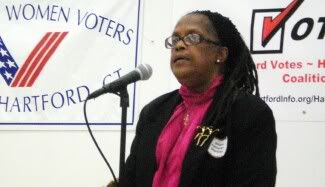 we already have. As for the presence of clinics in schools, Brad Noel indicated the obvious– children who can use a clinic within their schools do not have to miss a day of school to visit a clinic in their communities. She also promoted the ability for children to attend neighborhood schools.
we already have. As for the presence of clinics in schools, Brad Noel indicated the obvious– children who can use a clinic within their schools do not have to miss a day of school to visit a clinic in their communities. She also promoted the ability for children to attend neighborhood schools. 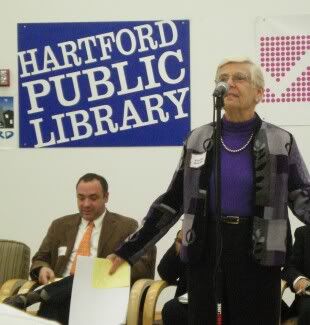 Brad Noel, 78, has the most experience in the Hartford education system, hands down. She worked for 25 years in Weaver High and has had a child and grandchild in the school system. She is currently the vice chair of the Board of Education. Patterson-Stallings, also a current BOE member, presented herself as level-headed. She also vouched for the importance of neighborhood schools and cited her original reason for running four years ago was the issue of parental involvement. She mentioned efforts to get parents more involved. Promoting physical education in schools, she explained that students have a full course-load and need to release the tension from that.
Brad Noel, 78, has the most experience in the Hartford education system, hands down. She worked for 25 years in Weaver High and has had a child and grandchild in the school system. She is currently the vice chair of the Board of Education. Patterson-Stallings, also a current BOE member, presented herself as level-headed. She also vouched for the importance of neighborhood schools and cited her original reason for running four years ago was the issue of parental involvement. She mentioned efforts to get parents more involved. Promoting physical education in schools, she explained that students have a full course-load and need to release the tension from that.
Luis Rodriguez-Davila was unimpressive. Sure, he seemed funny and personable, the kind of guy to grab a beer with, but did not strike me as serious enough about the position, even if he currently sits on the BOE. As one audience member noted, he spent a lot of time saying very little. Responding to a question about the student-based budget, after a long set-up, he sort of slid the blame elsewhere by saying that he has not been listened to as a board member. Really? Why would voters want to reelect someone who has been ineffective thus far? While it’s true, what he said about why 60% of our students fail if we’re doing so well, that changes take time, it’s also a straight up political response. How much time? How many terms will he have to serve before these changes grab hold? However, the Senator Clinton reference he made to back community use of schools gave him some old school cred. Too political. No thanks.
 Ines Duke Pegeas had some strengths and weaknesses. She had clear ideas about how the reform benefits magnet school students but does not do enough for special ed students. Duke Pegeas stated that the well-developed child must be taught respect, responsibility, and reason. When asked if she felt it was appropriate to allocate about half of funds for schools, her answer clearly demonstrated confusion about the question, as she first stalled and then asked “why are the services separate from the schools?” and suggested that the services be provided by them. After stumbling with this, John Motley graciously clarified for her that “services” include fire and police. She dodged the question some more and then announced that “fire and policemen need to be in the schools.” It was a bit uncomfortable to watch her flail like this, but her other responses were more informed. She flatly said that she “believe[s] in unions” and thinks the superintendent is trying to weaken the effectiveness of unions. Responding to the question about physical education in schools, she expressed the need for children to have their minds, bodies, and spirits developed. When asked how so many graduates could be functionally illiterate, she got straight to the point by calling out the unfortunate tradition of social promotion. Strangely, she did not refer to one of her strongest qualities — that she has been a teacher for 37 years — until her closing remarks.
Ines Duke Pegeas had some strengths and weaknesses. She had clear ideas about how the reform benefits magnet school students but does not do enough for special ed students. Duke Pegeas stated that the well-developed child must be taught respect, responsibility, and reason. When asked if she felt it was appropriate to allocate about half of funds for schools, her answer clearly demonstrated confusion about the question, as she first stalled and then asked “why are the services separate from the schools?” and suggested that the services be provided by them. After stumbling with this, John Motley graciously clarified for her that “services” include fire and police. She dodged the question some more and then announced that “fire and policemen need to be in the schools.” It was a bit uncomfortable to watch her flail like this, but her other responses were more informed. She flatly said that she “believe[s] in unions” and thinks the superintendent is trying to weaken the effectiveness of unions. Responding to the question about physical education in schools, she expressed the need for children to have their minds, bodies, and spirits developed. When asked how so many graduates could be functionally illiterate, she got straight to the point by calling out the unfortunate tradition of social promotion. Strangely, she did not refer to one of her strongest qualities — that she has been a teacher for 37 years — until her closing remarks.
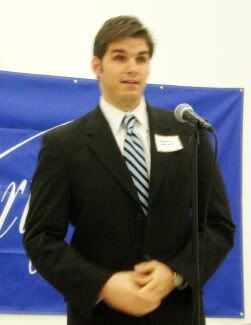 Finally, Albert L. Barrueco gave a better impression than what I was expecting. Part of my hesitation with him (and a few other candidates) is that he seems less qualified than I consider myself to be for the position. He only moved to Hartford in 2007. He does not have any teaching experience (unless he is keeping that fact hidden) and has no children. What is he besides cute and single? A lawyer. Energetic. Promising. Through the grapevine, I heard that he does some good work for the community, but this was not highlighted during the forum. His youth does not have to be a penalty, but it is obviously something that could have been compensated for with better research or transparency about all of his engagements (Commissioner of Hartford Parking Authority). None of his answers were appalling or terribly extreme, but too many of his perspectives were based on purely his own experience. On one hand, it is great that he was able to benefit from the American education system, especially programs like New Arrivals that help recent immigrants, but one must step outside his own experiences on occasion. This is especially true, I think, for candidates who may not have too much experience– get some facts and see how other people are being affected by policies. His best answer of the evening was in response to the question of whether or not it was appropriate for half of our funds to support schools: “Yes. Absolutely. It’s worth every penny.” He went on to refer to Duke Pegeas’ response to the same question by remarking that we would “need less police because you’ll be educating instead of incarcerating.” Not bad. Perhaps in four years he would be a stronger candidate.
Finally, Albert L. Barrueco gave a better impression than what I was expecting. Part of my hesitation with him (and a few other candidates) is that he seems less qualified than I consider myself to be for the position. He only moved to Hartford in 2007. He does not have any teaching experience (unless he is keeping that fact hidden) and has no children. What is he besides cute and single? A lawyer. Energetic. Promising. Through the grapevine, I heard that he does some good work for the community, but this was not highlighted during the forum. His youth does not have to be a penalty, but it is obviously something that could have been compensated for with better research or transparency about all of his engagements (Commissioner of Hartford Parking Authority). None of his answers were appalling or terribly extreme, but too many of his perspectives were based on purely his own experience. On one hand, it is great that he was able to benefit from the American education system, especially programs like New Arrivals that help recent immigrants, but one must step outside his own experiences on occasion. This is especially true, I think, for candidates who may not have too much experience– get some facts and see how other people are being affected by policies. His best answer of the evening was in response to the question of whether or not it was appropriate for half of our funds to support schools: “Yes. Absolutely. It’s worth every penny.” He went on to refer to Duke Pegeas’ response to the same question by remarking that we would “need less police because you’ll be educating instead of incarcerating.” Not bad. Perhaps in four years he would be a stronger candidate.
The election for Board of Education will be on November 3rd. Polls will be open from 6 in the morning until 8 in the evening.
UPDATE: Robert Cotto, Jr. has informed me that one piece of information was incorrect: “Just a correction on my part [there are actually] three positions recommended for a total of 900,000. This is far worse than what you wrote or I may have said.“

Matt Poland
Kerri: great post. thanks for covering this important event. Matt
Luis
Damn girl!! You getting paid for this? Great post! I was not there but this looks like it was one of the more successful candidate forums the library has hosted. Kudos to them and partner organizers.
kerri provost
Someone gave me a red Hartford Votes/Hartford Vota bag at the forum last night. Does that count as payment?
Thanks for reading this.
Leticia
Hi Kerry,
I was home with two sick children on Monday night and could not make it to the forum. Thank you for the informative post. You put me right there.
kerri provost
Sorry to hear they’re sick 🙁 There’s a lot of that going around right now.
I understand that Hartford Public Access will be airing the video of this event at some point. They have not announced when yet.
Heather Brandon
Linda Bayer sent out an email this morning saying http://www.accesstv.org has footage of the forum, but I can’t find it on the site. Also, video will appear at http://HartfordInfo.org at some point.
Richard Frieder
We’re hoping to have the video on hartfordinfo.org by early next week. Watch the site or follow me on Twitter – I’ll announce when it is available.
kerri provost
Thanks for the info!
Luis
By the way…that Republican soooo looks like Kevin Spacey!! Creepy
BoE Candidates Forum | IonHartford
[…] Real Hartford has put together a wonderful post of what happened at the forum with some helpful insight on almost all the candidates. Even Kevin Spacey made an appearance. […]
sujal
I’m confused about the suburban students comment by Lori Hudson. What suburban students? How does that correlate to the failure rate? I don’t know much about the Hartford school system, so excuse my ignorance. Heather tweeted the statement last night and I had the same reaction – it’s a statement begging for more explanation.
Sujal
kerri provost
I agree. Many of the remarks candidates made, unfortunately, assume that everyone has been paying very close attention to every move that has been made in the school system for the past two decades.
I believe she was referring to how test grades (etc) of schools show an increase which is mostly due to the presence of suburban students attending some of the schools (magnets). There was not really any supporting data given for that, which I would have liked to have heard. Without such data, it’s hard to say how accurate such a statement is.
David MacDonald
Unfortunately there were many statements by most of the candidates that can’t be substantiated by any facts. I was there and I heard mostly opinions.
David MacDonald
The test data that was released showing Hartford made a 4% gain in test scores and that every grade went up in reading scores includes only Hartford resident students. And Dwight school a neighborhood school has higher achievement than most magnet schools.
Heather Brandon
It’s not necessarily true that all the suburban students educated in Hartford are performing in the top five percent, and not necessarily all the city students are performing poorly, but Hudson’s idea was that we can’t tell anymore. I imagine the data is there for someone to parse. There are benefits to mixing suburban and city kids in the schools, but warping of the data doesn’t sound like one of them.
I understood the statement to be similar to criticisms of gaming the numbers in, say, police departments to show improvement and perhaps justify the continuation of certain programs or funding. From the parents’ angle, there’s frustration if students who continue to show poor performance are treated as less valuable or relevant and educational disparity is swept under the rug.
kerri
Thanks! That’s a better explanation.
I’m wondering, though, if the same can not be said for the gang data. I did not notice candidates questioning the information about gangs’ presence in schools the same way this was questioned.
David MacDonald
The test scores for Hartford do not include suburban students, only Hartford students. The magnet schools scores include data from their suburban students but the analysis of Hartford’s scores only included Hartford students.
AmyBergquist
Super round up, thanks for this!
Richard
Thank you Kerri for this excellent piece and for attending the forum and reporting on it. I had pretty much made up my mind about who to vote for and now I am more determined than ever to go out and cast my 3 little votes.
kerri provost
Gracias
Pamela Richmond
Great write up. I appreciate the detail you went into in distinguishing each of the candidates from one another from your perspective. Unfortunately, I was unable to make it, but from the feedback I received, it was a great forum to have attended.
kerri provost
Thanks, Pamela.
Thom Page
Kerri: Is it possible that Mr. Cotto’s facts and figures from his review of the budget was a smidgen off, when he corrected himself to say there were actually three positions in the school budget EACH paying $300,000.00 as you reported? Assuming if these were not annual salaries, that this would have been so noted, it seems incomprehensible to me.
kerri provost
Such a thing should seem incomprehensible to us all. I linked to the budget from the article, but here is the link again:
http://www.hartfordschools.org/documents/2009-10BOEAdopted-Final.pdf
Go to page 234. It’s there.
Real Hartford » Vote on Tuesday for Board of Education
[…] Just a reminder that the Board of Education election will be held this Tuesday from 6am to 8pm. For a list of polling places, go to the Registrar of Voters site. To read a detailed review of last week’s candidate forum, go to “BOE Candidates Forum: A Glance at Our Options.“ […]
Thom Page
Kerri (and Mr. Cotto): I believe correctly analyzing a budget is an important ability for any BOE member. I took a small dose of reality (there’s no way BOE employees are being paid $300,000/yr.) and did a quick google search and believe that page 234 of the BOE budget, where it speaks of “3 FTEs and $900,000 in salary” in no way represents 3 people being paid $300,000 a year, as professed by Mr. Cotto. In fact, if you peruse the budget for just a minute, FTE is used throughout the document and simple calculations/comparisons will make it clear this does not represent the actual FT employees being paid the salary numbers associated therewith. The budget is broken out in sections spreading costs/functions over various areas of the school operation, and page 234 speaks to “School Design and Choice” for example. I doubt this is an area of the BOE with 3 people working in it. Conversely, this is probably a function which has this much salary, expenses, etc. allocated to it out of the total allocations the board has to measure its performance.
FTE is commonly defined as Full Time Equivalents, and is a management measuring tool for personnel productivity in an organization.
Web search Definition: A full-time equivalent is the number of hours that represent what a full time employee would work over a given time period, for example, a year or a pay period.
For a particular company, a normal work week may be 40 hours. One person working 40 hours would be one FTE. If there are two employees that both work 20 hours in a week, that total is 40 hours, and this also represents one FTE. If one person works 40 hours and another works 20 in a week, this calculates to 1.5 FTEs. However, if one person works 60 hours, that also calculates to 1.5 FTEs.
Having a standard way to measure is very important when comparing to other companies. It is especially useful when benchmarking, which is the process of trying to improve by comparing against others. For example, two companies competing against each other may both have 500 employees. Company A uses a standard 40 hour week for all its employees, and therefore has 500 FTEs. Company B may hire many part time workers, so that they only use 400 FTEs. Wage rates being equal, salaries will be 20% less than Company A, and therefore the company can sell their goods or services at lower prices or make a higher income. Just looking at the number of employees would give a false impression to management, stockholders or potential buyers.
FTEs are also important to company management. After a reduction in employees, monitoring FTEs will verify if hours truly have been reduced, or if those employees have been replaced by the remaining working extra hours.
Read more: http://accounting.suite101.com/article.cfm/calculating_employee_fulltime_equivalents#ixzz0VgwYNsQw
If you know much about analyzing financial statements, it is clear the BOE budget is using the common management tool of FTEs to analyze productivity after a reduction in BOE employees (at least 237?) from the previous year’s budget, which is presented in the column next to the ’09-’10 budget.
I guess this gets back to my point of how important it is to get some folks with private business experience on the BOE.
kerri provost
Thom,
Where exactly on the web did you get that information? I have never heard that phrase used in the way that you are bending it. When you were running for a position a few years ago, you asked where I was from and I responded “South Green.” You then asked if I lived in one of the shelters. Whatever half-assed research you did to conclude that South Green residents probably all live in shelters, I just don’t know, but I wonder if this is the type of private business experience you are accustomed to.
Furthermore, it’s no secret that you are bumbling around the blogosphere promoting Barrueco. I’ll echo what I said in the blog post: the kid has potential, but he does not have nearly enough real world experience yet.
In the future, please edit your comments so that they are a reasonable length.
Luis
I’m sorry, but I just have to weigh in at a certain point… 3 FTE positions making $900,000 is a lot of money any way you slice it. Whether you are talking about 3 individuals each working 40 hours per week for an annual salary of $300,000 each, or 6 individuals each working 20 hours per week for an annual salary of $150,000 (not bad for a part-time job) or twelve individuals each working 10 hours per week for an annual salary of $75,000.
Point is, three FTE positions equals 120 hours of work per week whether its three employees or ten employees or 120 employees each working one hour per week. And the hourly rate of pay for these employees is $144.23 per hour.
So are we saying that we need someone with experience in the private sector where paying out $144 per hour for consulting fees is accepted practice. Hey, while we’re at it, why not fund the whole school system through the sale of credit default swaps.
Thom Page
Luis: In all honesty, read the article my post highlighted, and I think you will see that although your logic CAN work in defining FTE illustrations to a point, it is not the only methodology which can be utilized with FTEs. I really don’t think we are paying anywhere near the amounts your analysis would come to (although your methodology seems logical at first), but I don’t understand it well enough to explain. For instance, how does the BOE come up with the value of one FTE, and how does that figure into your analysis? Perhaps you can get an explanation from a BOE employee. This FTE analysis runs throughout the budget and is obviously a management tool for analyzing decreases in personnel from one year to the next. If you take your logic and apply it to all of the FTE numnbers in the budget, it just couldn’t add up to a logical salary figure. It would be great to really understand this tool and what, if anything, it is telling us about getting the same/less/more quality out of the BOE personnel. Thanks
Thom Page
Kerri: Don’t think I’m bending anything. Type in “FTE” into google and ask any BOE employees who worked on preparing the budget – maybe it’s “half-assed research” as you claim,but don’t think so. I actually left you one of several website addresses for FTEs right in my response, but perhaps you were too pre-occupied to see it. Despite your next attempt to discredit my simple research on FTEs, I never did/had any research on South Green residents. I have represented, and still represent, loads of folks in mental health facility commitment hearings who live in shelters surrounding South Green. I’m sorry I don’t remember our encounter, but if indeed it did happen and I indeed did say this, I’m at a loss as to why.
PS – I consider claims that I am “bending” research which is “half-assed” while “bumbling around the blogosphere” to be prety near “Rude, inflammatory and irrelevant” to the topic at hand (not to be published?). Still, I am dearly sorry I have obviously upset you somehow.